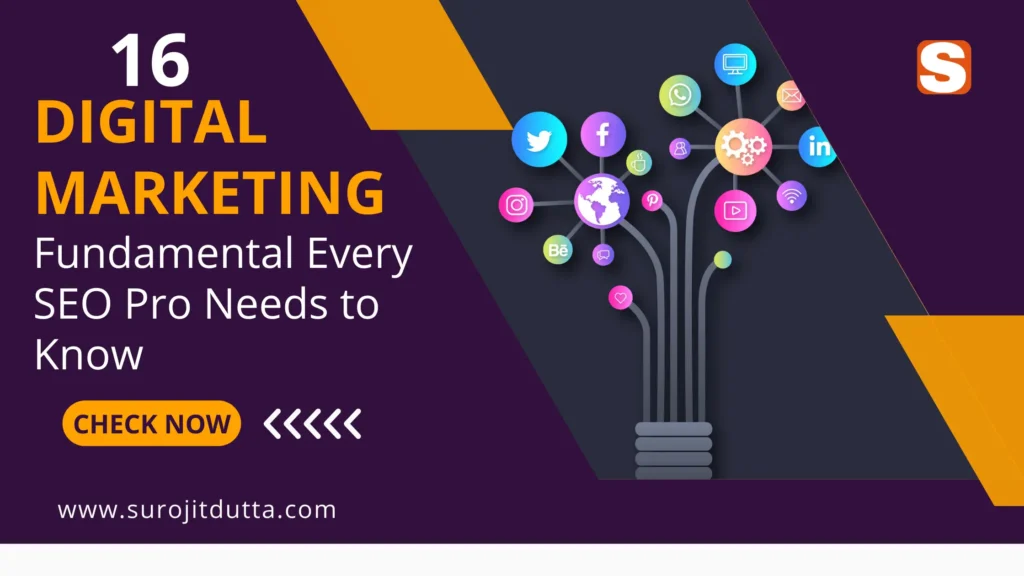The field of digital marketing has exploded over the past several years, and nowadays, it’s rare to find an online business that isn’t investing in some form of digital marketing. These days, even if you work in a more traditional field (like advertising or journalism), you’ll still need to have some basic knowledge of digital marketing in order to stay competitive with your peers. So you should know the digital marketing fundamentals to work in this field.
16 Digital Marketing Fundamentals
That being said, there are some very basic digital marketing fundamentals that are essential to any marketer who wants to be successful in this fast-paced industry – and I’m going to teach you those 16 fundamentals today!

1) How Search Engines Work
The first step of digital marketing fundamental is how a search engine like Google works and ranked a website. Search engines like Google have changed dramatically over time, but their overall function remains much the same. Search engines are tools that help us sift through a mountain of information and present us with pages we’re most likely to be interested in—including pages about your products and services.
This means having a search engine optimization (SEO) strategy is key if you want your content to be found on search engines. Let’s go into some detail about how search engines work so you can use that knowledge wisely in creating your digital marketing strategy.
You May Also Like: 15 Principal of effective communication skill that you need to know
2) The Fundamentals Of Competitor Analysis
Competitor analysis is another digital marketing fundamental that you should know first to compete with others. One of your top priorities as an SEO pro is collecting competitor data. This information can help you decide what content to create, what keywords and topics you should rank for, and how your competitors are ranking themselves. A good analysis helps you understand your competitive landscape and see where there’s room for improvement. To help give you a better picture of things, we’ve compiled a list of 10 fundamental principles every competitor analysis needs.
One of your top priorities as an SEO pro is collecting competitor data. This information can help you decide what content to create, what keywords and topics you should rank for, and how your competitors are ranking themselves. A good analysis helps you understand your competitive landscape and see where there’s room for improvement.
3) How Online Advertising Works
Before you can understand how digital marketing works and digital marketing fundamentals, it’s important to know that it’s much more than simply buying ad space and blasting out messages about your business. You may think of digital marketing as just traditional advertising online, but with a few key differences: Your ads are exposed to users who are actively searching for your product or service, rather than consumers who happen upon your marketing.
Online ads are highly targeted, which increases their value. Finally, if you choose social media platforms like Facebook and Instagram, you have tools available that help makes sure that your ad is seen by many users (for example, on Facebook you can pay to boost a post).
You may also like: You need to know the Pinterest common mistakes
4) Social Media Marketing Strategy
It’s easy for Social Media Marketing Strategy pros to get caught up in all of their tactical requirements, making it tough to identify what they need most: talent. That’s why we sat down with some of our experts and asked them where they thought talent was required most in the marketing department. They were quite surprised at how much overlap there was.
See below for a list of skills that got mentioned more than once—and not necessarily in order: Content Strategist – Knowing your target audience is key, and content strategists are just better at doing that across multiple platforms than anyone else (and what differentiates you from your competitors).
There should be one person responsible for developing content strategy (and managing its execution) for both social media marketing and general web content. So social media marketing plays an important role in digital marketing and you should know the digital marketing fundamentals.
5) The Fundamentals Of Website Analytics
Website analytics is a very important part of SEO and it is the main digital marketing fundamental so you should learn it very clearly. Although website analytics can seem complicated, Website analytics are actually simple to understand once you have been introduced. The purpose of analytics is to tell you how people are using your website so that you can make it work better for them and more effectively for your business.
Analytics don’t just help you run a more effective online business; they also allow you to assess how successful your digital marketing campaigns are, too. Once you understand what website analytics are and how they can be beneficial for your online presence, there will be no stopping you from creating an engaging website that converts readers into customers.
6) Analytics of keywords Tracking of a Website
Website analytics and keyword analytics are almost Analytics are related to research and it also digital marketing fundamentals. can provide very insightful information about which keywords you should be focusing on. For example, a website might be making five times as much money off of a certain keyword than another one. If you’re an SEO pro, knowing that kind of information can allow you to focus your energy and efforts in a more profitable direction.
Tracking also allows you to see which keywords are performing best and worst, so you know where to put more effort or what keywords to stop wasting time on. Using analytics effectively is among the most fundamental aspects of digital marketing; if someone doesn’t realize their importance, they probably aren’t ready for work in our industry.
You May Also Like: How to generate huge traffic from Pinterest to your website or product
7) Create digital content that answers questions
Creating digital content that answers questions related to your company or industry give people who are curious about your product an in-depth look at exactly what it is. More than likely, you already have a decent idea of what you do and why it’s important; however, people can’t connect with that information unless they have all of their questions answered.
Even if a prospective customer doesn’t end up using your product or service, he or she can walk away with more information than they started with. As someone who’s trying to improve his or her digital marketing skills, look for opportunities where you can provide education for others; in many cases, you won’t even be selling anything in return!
8) Keywords are like a magazine category
For example, if a term is too broad (like garden gnomes), it's unlikely that anyone would be searching for it. On a basic level, keywords can make or break a campaign. They're what people are looking for when they go to search engines and use certain apps. And while they do matter, they're not all that matters. But before we dive into what else you need to consider, let's talk about how you should choose keywords.
To understand why keywords are so important, think of them as a magazine category. If someone were interested in reading an issue on gardening they wouldn't pick up one on business because those two things don't relate to each other.
You also want to avoid picking a keyword that's too specific (like tulip bulbs). That's like picking up an issue on tulips instead of gardening; yes, it might be related but there's probably going to be better content out there on your topic.
9) Long-tail keywords vs. short-tail keywords
There’s a theory in web marketing known as long-tail keywords. It goes like this: While short-tail keywords (think, running shoes) attract massive amounts of traffic, they tend to convert at a much lower rate. Instead, creating content optimized for long-tail keywords (like how to start running) can dramatically increase your conversion rates while also increasing traffic since it targets people who are looking for more detail-oriented advice.
If you haven't yet begun experimenting with long-tail keywords, make sure you do! They're an incredibly valuable SEO tactic that every expert should be using—and one that takes time and effort to perfect. No one will have as many visitors through search engines if they aren't using long-tail keywords. Short-tail and long-tail keywords are important to rank any website or any page of a website. So the keyword game is another digital marketing fundamental.
You May Also Like: How to grow email list for email marketing
10) Understand how search engines read websites and Rank
Understanding how search engines read websites and rank them will help you identify problems within your own website, as well as optimize it for search engines. This may seem pretty basic, but if you really want to improve your website.
There are a few basics that you need to understand first. 1. Keyword Targeting/Optimization While keywords may not be as important as they once were, understanding how Google interprets keywords and phrases is essential in getting your site ranked higher in searches.
11) Decide what type of website you have before you design it
It’s important that you consider your goals before designing a website. It is critical to your success that you build a website with the right structure and features so it meets all of your objectives. If you are confused, you can take help from anyone in the market and check a number of resources. Some more advice -design a site at the start only after deciding on goals and target audience; therefore, invest heavily into research as it is essential if you want to succeed.
Design based on how people will find your site –people expect certain things from sites they visit. There are differences between corporate and consumer expectations, but it doesn’t mean you can ignore one set of users in favor of another.
12) Developing your personal brand will help lead to more job opportunities
Not only does a strong personal brand help SEO pros land more interviews, but it also boosts their job performance once they’re hired. Employers want employees who know how to brand themselves and bring some sizzle to an industry that's often perceived as dry.
Developing your personal brand will help lead to more job opportunities and better work experience. That's good for you, but it's also good for employers who are looking for creative talent with sizzle. The best part is that personal branding doesn't have to be all that time-consuming; even adding just a few hours per week can go a long way toward helping you land more job opportunities.
You May Also Like: How to create a money making blog
13) How To Setup Google Analytics Account
Even if you’re a solo marketer, Google Analytics is an important way to see how your marketing efforts are doing. Set up your account in advance and make sure it gets regular usage so that you can see what’s working and what isn’t.
Your analytics will also help you plan content distribution; for example, if you find that posts about dogs get 20% more engagement than ones about cats, then it makes sense to share more cat-related content! But above all else, don’t forget that GA is one of many marketing tools at your disposal; in fact, some marketers swear by alternatives like Kissmetrics. It doesn't hurt to have an advanced tool on hand when things get busy.
14) How To Setup Google Search Console Account
Google’s new Search Console is a critical component of your digital marketing strategy. Here’s how to get set up and why it matters. One Step At A Time: The learning curve for Google Search Console is steep, but don’t try and learn everything at once.
Start with one feature and focus on getting that up and running. For example, if you have an e-commerce site then you will want to track your product pages closely by setting up Google Analytics integration right away.
If you run an SMB website or landing page then start tracking all of your pages as soon as possible (including deep links) so that when queries are reported in Search Console they are sent there too.
15) Conduct keyword research with free tools and Pro Tools
Whether you prefer Ahrefs, Moz’s keyword research toolset, or something from SEMrush, you can use free tools to get started with keyword research. These services all offer their own strengths: SEMrush allows for up to 500 queries per month and pulls from Google, Bing, and Yahoo databases; its results provide a good top-level overview of search volume and estimated AdWords competition.
Ahrefs is even more powerful—its database includes information from over 100 other sites—but it only pulls from Google search results.
You May Also Like: Best 45+ Way to make money online
16) Learn about link-building techniques that also help with search engine rankings
Link building is an essential part of any digital marketing campaign, but it also plays a role in your search engine optimization strategy. The web is ever-changing and algorithms change along with it. We are constantly learning about link-building techniques that benefit search rankings as well as provide a positive user experience.
In fact, some links that would have hurt your rankings just a few years ago now help improve them. These tactics may help you avoid doing anything that might get you into trouble with Google or other search engines; we suggest you always keep track of what changes and when so you know how new updates will affect your SEO efforts moving forward.









